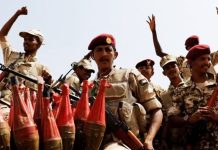In the dead of night, as HMS Al Diriyah approached Sudan’s coast, Saudi officers flicked on sweeping search lights to secure safe passage for their warship into a harbour rapidly transforming into a major evacuation and humanitarian hub in Sudan’s deepening crisis.
Even at 2am two other hulking vessels were also anchored offshore at Port Sudan, its largest port, waiting their turn in this international rescue effort.
“I feel so relieved but also so sad to be part of this history,” Hassan Faraz from Pakistan told us, visibly shaken.
We reached the quayside in a Saudi tugboat at the end of a 10-hour journey through the night in HMS Al Diriyah from the Saudi port city of Jeddah. A small group of foreign journalists were given rare access to enter embattled Sudan, if only briefly.
“People will be speaking about these events for many years to come,” Faraz reflected, as a long queue formed on the wharf for passports to be checked against the Saudi manifest. This time, it was many young workers from South Asia who said they had waited here for three long days – after two hard weeks in this hellscape of war.
Another man from Pakistan, who said he had worked at a Sudanese foundry, spoke of having “seen so much, so many bomb blasts and firing”. Then he fell silent, staring into the sea, too traumatised to say more.
The fighting which raged in recent weeks, amidst very imperfect and partial ceasefires, is a pitched battle for power between the Sudanese army led by Gen Abdel Fattah al-Burhan and the Rapid Support Forces (RSF) paramilitary group headed by Gen Mohamed Hamdan Dagalo, widely known as Hemedti.
“Port Sudan has fared relatively better in this war,” my British-Sudanese colleague Mohanad Hashim explained. “Fighting only erupted here on 15 April, the first day, but now this port city is overwhelmed by people fleeing Khartoum and other places.”
We had just sailed past the graceful Naval Club turned tented village for the displaced. Many people are now sleeping rough on the streets as they wait for a way out. Local hotels are swamped by people with passports from the world over, along with emergency consular services hastily established by embassies who have evacuated most of their staff from the capital.
Source: bbc.com









